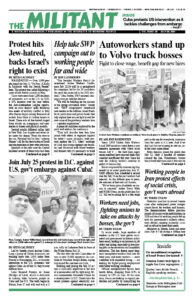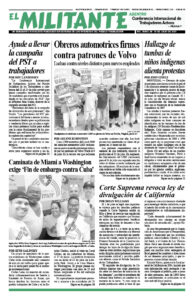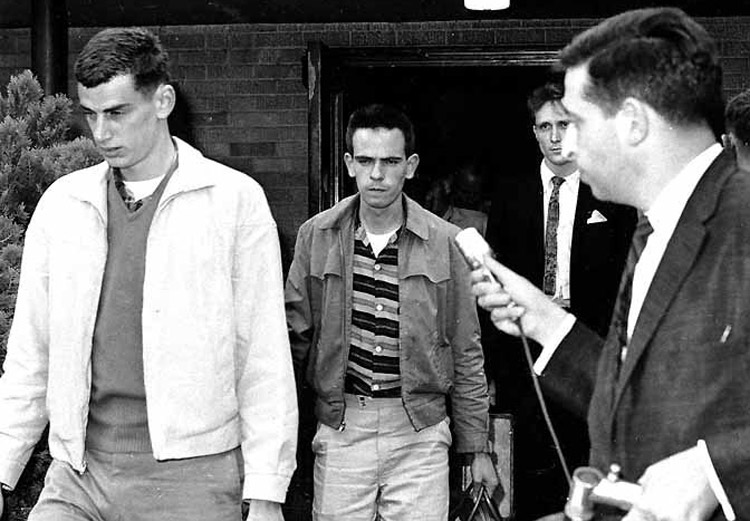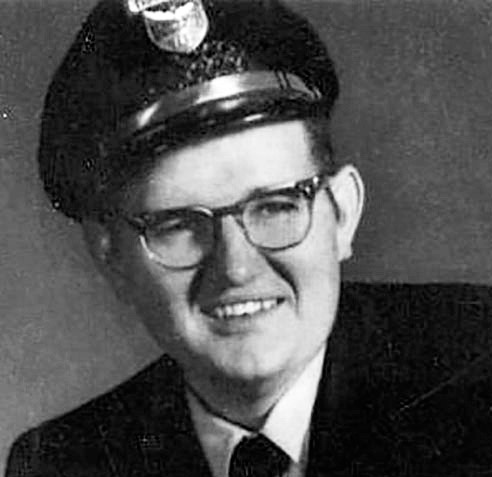This year marks the 60th anniversary of the Freedom Rides, one of the high points of the Black-led proletarian civil rights struggle that overturned Jim Crow and decisively changed social relations in the U.S.
Despite U.S. Supreme Court rulings in 1946 and 1960 that outlawed segregation in interstate travel, Jim Crow state officials ignored them across the South. So civil rights fighters decided to launch the Freedom Rides to win this themselves. In response to a call by the Congress of Racial Equality, volunteers set out from Washington, D.C., on Greyhound and Trailways buses May 4, 1961, with the goal of reaching New Orleans and desegregating bus station facilities along the way.
They were met by cop and Klan violence. In Rock Hill, South Carolina, segregationists beat Black riders after they attempted to use a “whites only” restroom. In Anniston, Alabama, a mob of white supremacists halted the Greyhound bus May 14, pelted it with rocks and bricks, smashed windows with pipes and axes, and lobbed a firebomb into the bus. The mob tried — unsuccessfully — to block the Freedom Riders from getting off the burning bus.
A few hours later, Freedom Riders on a Trailways bus were brutally beaten after they entered a whites only waiting room and restaurant at the bus terminal in Birmingham, Alabama, as the notorious Sheriff Bull Conner pulled his cops off the scene. They were rescued by Rev. Fred Shuttlesworth, who led a force of civil rights fighters to free them.
The liberal New York Times blamed the Freedom Riders for their being beaten, saying their trips were a “provocative action.” The John F. Kennedy administration tried mightily to talk them into abandoning their fight.
In response, hundreds more volunteers, including activists from the Student Nonviolent Coordinating Committee, signed up to join the Freedom Rides.
But they faced a problem. As they prepared to lead off from Fisk University in Nashville, Tennessee, heading to Jackson, Mississippi, every Trailways driver turned down the job. Then Jimmy Allen Ruth, a 23-year-old Caucasian driver from Tennessee, who died last month at 83, volunteered.
“Ruth was willing to aid in the cause for freedom and justice at all cost,” his family members wrote in their obituary. He considered it “one of his greatest accomplishments.”
“If they were going to die, I was going to die with them,” Ruth told them. “He agreed to drive the students and never asked any questions although he was aware of the risks involved,” his brother, Bobby Ruth, and friend Blondell Strong Kimbrough, told the press.
Freedom Rides grow
Dozens of youth across the country responded to the call to resume the Freedom Rides. One of them was 18-year-old Ken Shilman, and another his best friend, Joseph McDonald, both recent graduates of Oceanside High School on Long Island, New York. They made their way to Montgomery, Alabama, and got on one of the buses.
When the Freedom Riders’ buses reached Jackson, the cops arrested them, on charges of violating a recently passed breach-of-the-peace statute. They were convicted, fined $200 each, and, when they refused to pay, sentenced to 90 days in jail. Through the summer months over 300 women and men were arrested — many incarcerated in Mississippi’s notorious state penitentiary in Parchman Parish, where jailers attempted to humiliate and harass them.
Shilman was among the first arrested, on June 2. He and McDonald were escorted by authorities out of the “colored waiting room” at the Trailways station. They were imprisoned for three weeks at Parchman. Then the Freedom Riders decided some of their prisoners should get out and go home to get the word out about conditions in the prison.
Shilman and McDonald were two of those chosen. In Oceanside they were able to get an interview with The Associated Press June 21, speaking out about the “indescribable” conditions the prisoners faced. AP reported Shilman’s description of two fellow Freedom Riders, “dragged naked along 60 yards of concrete corridor after they refused to strip and walk in their cells.”
Shilman went on to join the Young Socialist Alliance and became a National Committee member and leader of the Socialist Workers Party and its work in the trade unions. He died in 1989.
From the Montgomery Bus Boycott of 1956, through the Freedom Rides, to the 1963 Battle of Birmingham, led by Shuttlesworth, to the 1965 voting rights fight in Selma and Montgomery, Alabama, this historic social struggle would continue, changing the potential for working-class unity and the U.S. class struggle forever.



